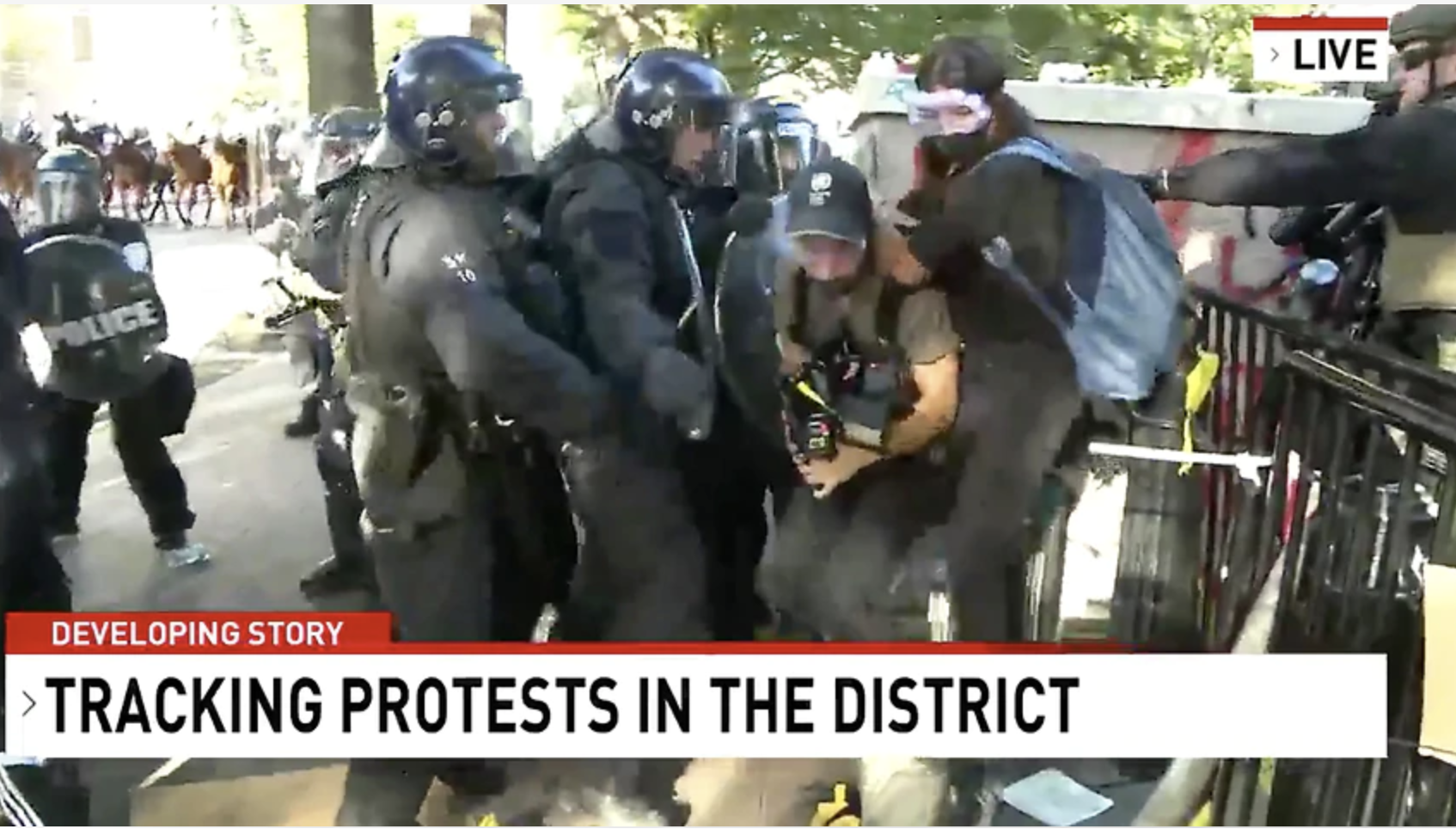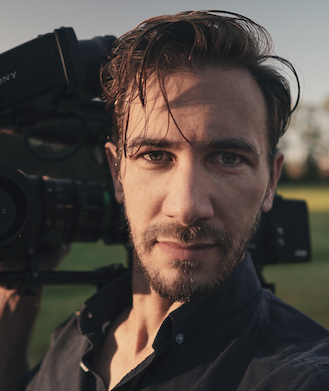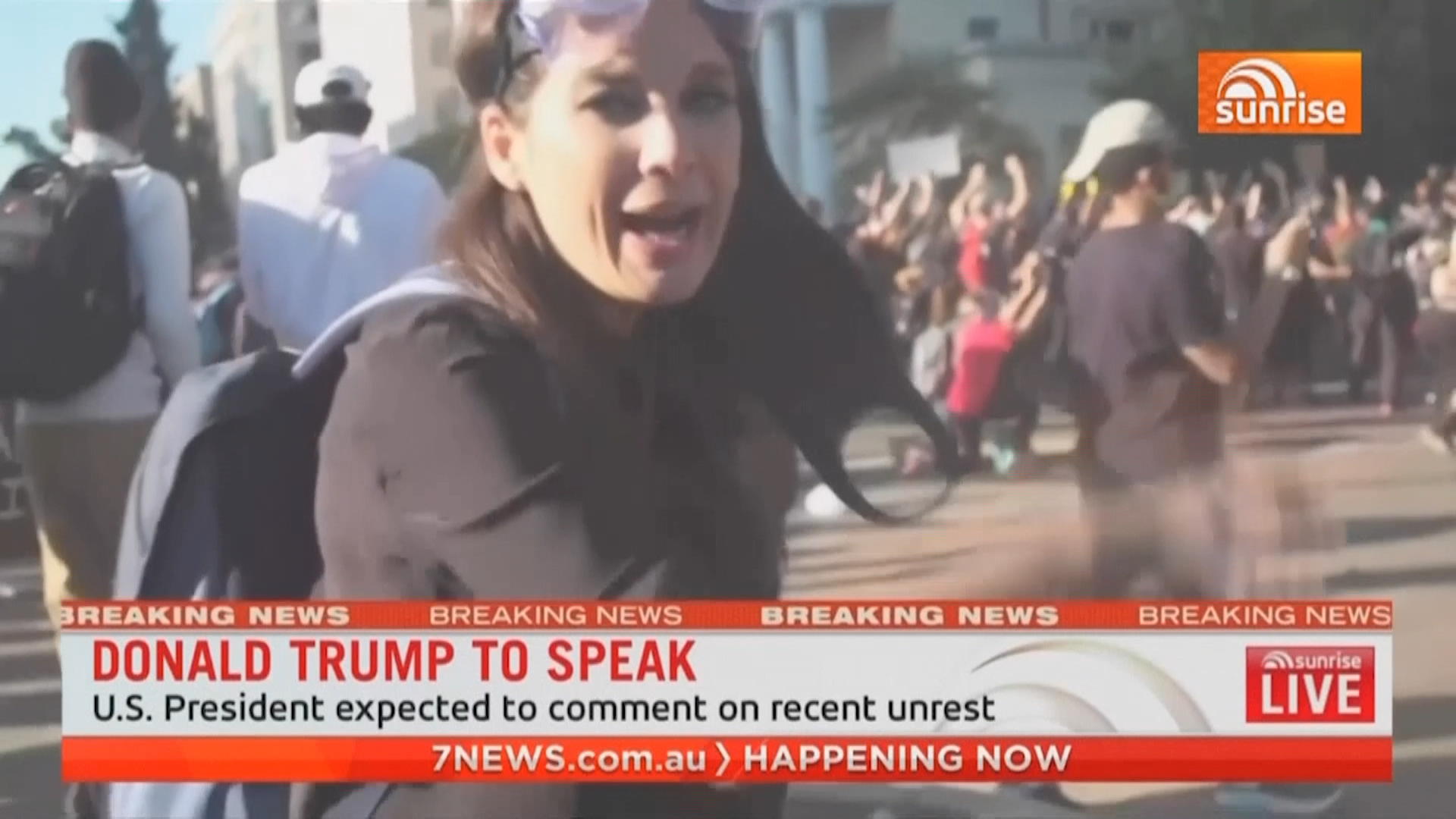2020 winner of the Television/Video: News Reporting Walkley Award with Tim Myers for “Beat the Press: Journalism under Attack”

Amelia Brace
Amelia Brace and Tim Myers’ coverage of the Black Lives Matter protests outside the White House had a profound impact around the world.
The far-reaching nature of their reporting, their storytelling ability and their gripping pictures provided a raw insight into the civil unrest that was engulfing the US.
Brace and Myers showed not only outstanding camera work but also outstanding courage. They were live on-air outside the White House when riot police violently moved in, assaulting both Australians. Myers was struck in the stomach by a shield and punched in the face; Brace was struck in the back with a truncheon and gassed with a chemical irritant. Both were hit with non-lethal rounds from automatic weapons. They displayed composure under stress, continuing to broadcast live as they made their way to safety.
We spoke with Amelia shortly after the 2020 Walkley Awards about keeping your cool and reporting calmly in chaotic, violent and unexpected situations, her passion for politics and regional news, and how the US attack footage brought out a heartening solidarity from Australian media.

Image via SBS
Congratulations Amelia to yourself and cameraman Tim Myers for taking home the TV News Reporting Walkley Award — how does it feel to be recognised by your peers for this particular piece of exceptional work?
It’s really exciting and really humbling for Tim and I to be recognized by the Walkley Foundation. It’s such an esteemed award and I think both of us never, never expected that we would even be finalists, let alone winners in this category.
But as we’ve both said, for us, this story and now this award really isn’t about us. It’s about what happened that day and the benefit of what happened to us — despite the fact that we were both quite battered and bruised — is that it drew attention to what happened there outside the White House and the fact that this group of people were peacefully and legally protesting. And just like us, they were treated very brutally.
“If we weren’t there, right in the middle of it, on the front lines, people wouldn’t know what truly happened that day”
It also draws attention to the role of the media, and the fact that if we weren’t there, right in the middle of it, on the front lines, people wouldn’t know what truly happened that day.
And it draws attention to the fact that we need to be able to do that safely or there will be times when people don’t know what’s happening, and that is very important, but also very scary.
Taking us back to Washington Square, where the events happened, can you talk us through how it unfolded and what the aftermath was?
It’s a cliché, but it all happened quite quickly. We were there for the afternoon and we’d actually been out the night before covering police enforcing the curfew. So despite the fact that was an actual violent evening, we did feel like we were across how we could cover that safely, while still making sure that we were getting the story out there accurately.
But on this day the police moved in significantly earlier, about half an hour before that curfew was due to be enforced. So, not only were we caught off guard, but all the protesters there were. And as you can hear in my reporting on the day, there were people yelling, “It’s not time yet, there’s still half an hour, or there’s still 20 minutes.” I think the timing was a huge factor in the chaos that we saw.
“The fact that it was so unexpected but also the fact that it was just so brutal. They came charging forward at an alarming pace and it meant that people who were trying to get away, including us, just couldn’t”
The fact that it was so unexpected, but also the fact that it was just so brutal. They came charging forward at an alarming pace and it meant that people who were trying to get away, including us, just couldn’t. There was an absolute bottleneck of protesters who couldn’t move away. We saw people genuinely trying to do the right thing who were getting hit in the back, as I was, which very much proves that you’re trying to move away from the police, and that just kept happening.
It felt like every time people would move back, the police would come forward again in this big charging motion. That was the first incident that happened, but then it just kept getting worse.
After that, that’s when we started getting hit by the nonlethal projectiles. They were being fired from inside the park into the crowd. They’re meant to be fired at the ground and they bounce up and hit — I actually got hit directly by one, which really hurt. I’m just really pleased that I knew that they were using nonlethal bullets because the pain, I honestly would have thought that I’d been shot. Then all of a sudden there’s gas in the air.
“We started getting hit by the nonlethal projectiles… I actually got hit directly by one which really hurt. I’m just really pleased that I knew that they…were using nonlethal bullets because the pain, I honestly would have thought that I’d been shot. Then all of a sudden there’s gas in the air”
There’s still debate over exactly what kind of gas it was, but I can tell you, there was a chemical irritant in the air that day. It just felt like everywhere we turned there was some other form of danger. All the while, this line of police was coming through, some on horses by this stage, just chasing us. It ended up going for about 35 minutes, just desperately trying to get away from them.
But also, we’re live on air the entire time trying to explain to people what’s going on while keeping one eye on trying to make sure that we’re in the safest place we possibly can be.
Did you have any training or sources that you called upon to keep your calm and continue reporting at the same time as all this chaos was going on?
No, not really, to be honest. I don’t think you know how you will react in a situation like that until it’s upon you. There were a few times I felt like my voice went a bit high and I sounded a bit shaky and I was annoyed at myself about those because I was, obviously, trying to stay composed and keep telling the story of what was happening. I didn’t want it to be about myself or Tim, I wanted it to be about, “This is the situation that you are seeing outside the White House.”
“I remember making that point that, ‘This is the United States of America. This is meant to be the world’s greatest democracy and take a look at the way these people are being treated when they are doing something that are legally allowed to do’.”
I remember making that point that, “This is the United States of America. This is meant to be the world’s greatest democracy and take a look at the way these people are being treated when they are doing something that are legally allowed to do.”
In terms of the first incident, where I got struck across the back, my main motivation was that I knew my dad was watching live at home, and I knew if I didn’t pop my head back up and show him that I was okay, he’d probably spill his cup of tea. That’s when I gave the big thumbs up. Initially, it was very much about making sure that my family saw that I was still OK, I was still going strong. But then it just became this rolling chaos, and it became really important to me to explain exactly what was happening and why it was so egregious.
What have been, for you, some of the most significant impacts that this footage has had?
It became a huge story, and the whole time we were trying to make it very clear that it wasn’t about us. It’s your goal always as a member of the media to not become the story. Sometimes, obviously, you cannot help it, but again we just wanted to highlight the fact of what was going on there.
The fact that these protests were about police brutality, and then the way that we were treated as, clearly, members of the working press, was just naturally a huge headline. It was big news in the US, it was big news across the world, really, with the Australian government becoming involved. I was called to testify before Congress about what happened.
“When something happens to the media, it’s not because we are more precious or more important than anyone else, it’s because…if we are not there telling you what’s happening, then you won’t know what’s happening. And that’s really dangerous”
That in itself was quite terrifying, to be quite honest, but I think that shows the magnitude of it. And I think it’s important that it is taken seriously, that when something happens to the media it’s not because we are more precious or more important than anyone else, it’s because we are everyone else. And if we are not there telling you what’s happening, then you won’t know what’s happening. And that’s really dangerous.
What was it that originally that made you want to get into news reporting?
I kind of came in backwards. I was very interested in politics and studied political science at university, and then realised pretty quickly that I didn’t want to be a politician, I wanted to talk about politicians. So I did post-grad journalism and have never looked back.
I became an intern at Seven News about 12 years ago and I’ve been with the network ever since, working my way up. My dream job was to be a political reporter in Canberra and I was lucky enough to do that with the likes of Mark Riley and Tim Lester, two of the greatest journalists I’ve ever worked with.
I did that for a few years before I went to LA, and I just learned so much. It’s amazing now for me to try to work out what I want to do next. I’m still very much interested in politics, obviously. I covered Trump’s first and only term in office which was, uh, something I never would have dreamed of as a politics student.
In terms of what I’ve been through now, it has made me more passionate about the role of the media and how important it is. And that’s something that, from now on, I intend to keep focusing on and keep drawing attention to.
Out of the many stories that you’ve told both as a correspondent in the US and also here in Australia, what are some that stand out as the stories that make you most proud?
Well, I started in regional news. I’m from regional Queensland and I always find local stories the most enjoyable to tell, but also some of the most important to tell because it might not be on the grand scale that everyone across the country or the world is talking about you, but it might make someone slow down when they’re going down a certain road, or it might make someone care a little bit more about their neighbour. Regional stories are still something that I’m really passionate about. Even now, I’m based in Sydney but I’m still always out there looking for those stories in the bush or a few hours out of town that I can tell.
I’m obviously really proud of this story and what Tim and I did that day, but again, it just kind of happened and now it’s almost in hindsight. Whereas there are other things that I’ve worked on over a longer period of time [that] you look at in a different way. It’s not about the scale of what you do, it’s not about the exposure, I think it’s about the importance and telling the stories of the people that you meet along the way.
Do you have a message to Australians in general about the importance of having a free and financially supported press that is able to do its job properly?
There is an incredibly dangerous rhetoric at the moment — the fake news rhetoric, the press as the enemy of the people rhetoric. And it’s easy for people to get swept up in that because, like any industry, there are some bad actors or there are some people who are just looking for fame or looking for a headline.
But on the whole, there are many journalists who take their job very seriously, and it is a serious and important job. We are the Fourth Estate, we are there to hold people to account so that everyday Australians don’t have to. I think what happened in Washington, DC was a perfect example of that. People said to me, “Well, you were in the way. You were on the wrong side of the fence.” Both of which were very much untrue.
“The fact is, we can’t do our job from a block down the street, we can’t do it watching at home on Twitter. We have to be there to tell you exactly what is going on”
The fact is, we can’t do our job from a block down the street, we can’t do it watching at home on Twitter. We have to be there to tell you exactly what is going on. I put to people, “What if it was the police being attacked that day? Would you not want someone there to tell you that this is what I saw and you can trust me?” I do hope that over time we can repair the relationship between the media and the people because we really are on the same team and it’s important that we work together to hold others to account.
Is there anybody that you would like to give a shout out to for their help with this story and their contribution towards winning this award?
Obviously I would like to thank Tim, he took a much heavier hit than I did on the day. He really copped it in the guts, is what I think I said at the time. But he was so calm in making sure we got out of that situation. We actually listened to the full tape for the first time just before I went to Congress and it was so interesting to hear what we were saying to each other that wasn’t going live to air and how much he was supporting me and vice versa. We’re actually neighbours in LA so to find ourselves in that situation was very unexpected, certainly not a situation we ever want to be in again. I definitely want to thank him for his support and guidance.
“It was very humbling and very nice to know that when it comes down to it, we are all in this together and we really look after each other”
Of course, everyone here at Seven, they’ve been my work family, as I call them, for more than a decade now. I can’t imagine getting through that without the calls from people like my boss, Emma Dallimore, Mark Riley in Canberra who talked me through addressing Congress when I was absolutely terrified. Just everyone who came together to support us, and even people from other networks who raised concern. It was very humbling and very nice to know that when it comes down to it, we are all in this together and we really look after each other.
Read all the 2020 Walkley Award-winners here.

Amelia Brace has been a reporter for Seven News for more than a decade, starting her career in Queensland before moving to the Federal Press Gallery. Her coverage of the June protest outside the White House and her assault at the hands of police drew global attention. She was called to testify before the US Congress, where she made a stand on the importance of a free press.
 Timothy Myers ACS is an award-winning freelance camera-journalist based in the US. He has recently been engaged by the BBC, CNN, the UN and others to film special investigations, human interest stories and breaking news events in hostile environments. Myers’ images of the protest police aggressively clearing peaceful protesters were hailed as depicting a violation of constitutional rights and an infringement on press freedoms.
Timothy Myers ACS is an award-winning freelance camera-journalist based in the US. He has recently been engaged by the BBC, CNN, the UN and others to film special investigations, human interest stories and breaking news events in hostile environments. Myers’ images of the protest police aggressively clearing peaceful protesters were hailed as depicting a violation of constitutional rights and an infringement on press freedoms.


